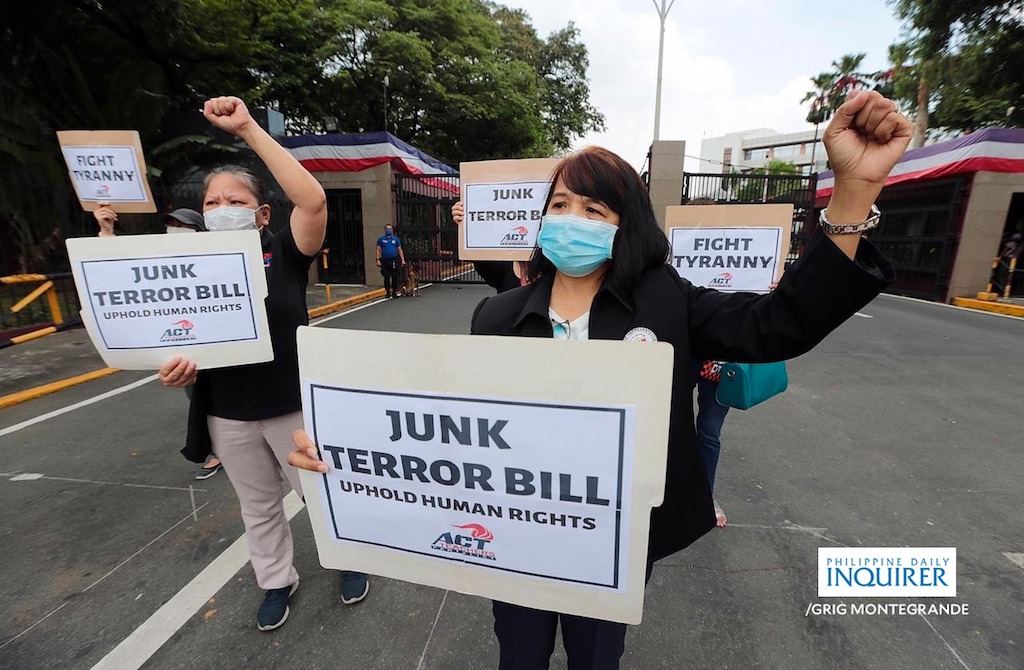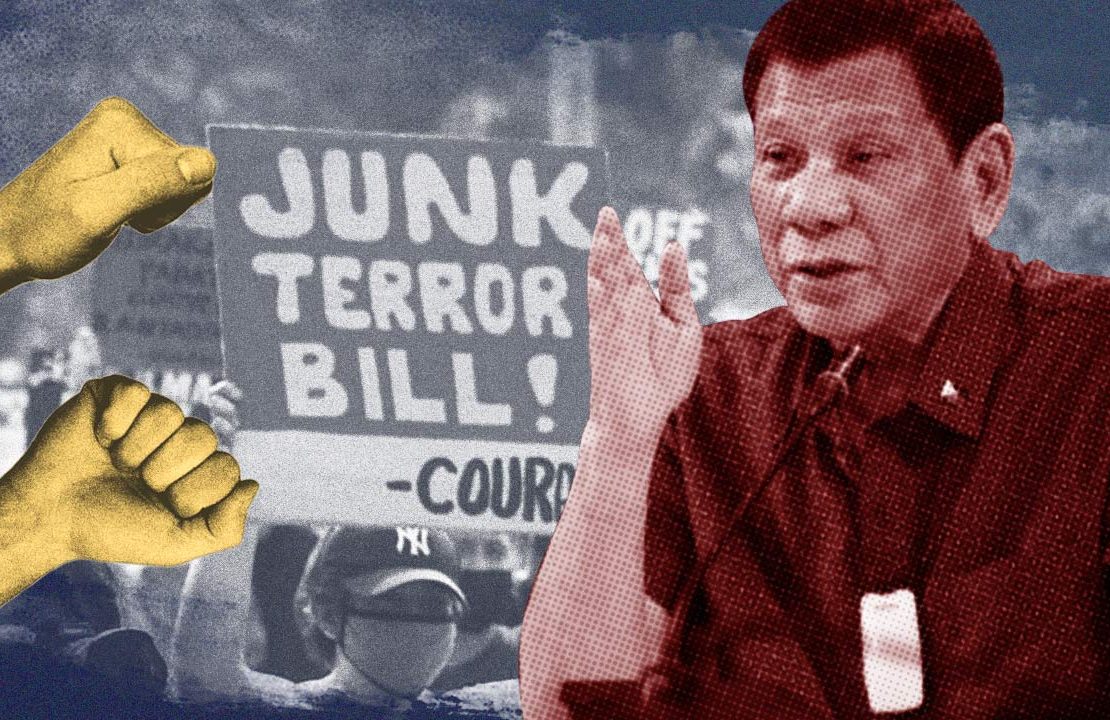Yesterday, July 3, the controversial Anti-Terror Bill was signed by President Rodrigo Duterte. Now officially Republic Act No. 11479 or the Anti-Terrorism Act of 2020, the law will take effect 15 days after it was published in the Official Gazette yesterday. Afterwards, government officials and authorities can tag civilians as terrorists if they are threatening (Sec. 5), conspiring (Sec. 7), inciting without any direct part in the commission of terrorism (Sec. 9) or joining (Sec. 10) and being an accessory without having participated in terrorist groups (Sec. 14).
[READ: Terrorism undefined: The Anti-Terrorism Bill is an indication of an authoritarian regime]
The bill has widely been considered as unconstitutional by various groups as it blurs differences between criticism, criminality and terrorism.
[READ: In photos: Groups “celebrate” Independence Day at the “Grand Mañanita” protest in UPD]
What’s next?
Once the law takes effect, government officials and authorities can imprison civilians engaging in the aforementioned activities. It can lawfully restrict travel of those tagged as suspect terrorists. Individuals suspected of terrorism can be put under house arrest (Sec. 34). Other provisions in the law also allow surveillance for up to sixty days (Sec. 16) and detention without judicial warrant of arrest (Sec. 29). According to the new law, those arrested and detained without warrant can be kept for 14 days (Sec. 29)—which is contrary to the 1987 Constitution that only allows warrantless detention for up to 36 hours (Art. 125 of the Revised Penal Code).

While any civilian critical of the government may be a target of being tagged a terrorist, the underprivileged, such as those under the poverty line, indigenous peoples in remote areas and communities threatened by corporate interests, will be caught in the crossfire between government authorities and rebels. Already experiencing the negative effects of poverty amid a pandemic, they will bear the brunt of the law as they may not have the means to defend themselves.
Can it still be stopped?
According to the Atty. Romel Bagares, professor of International Law at the Lyceum Philippines University College of Law and former executive director at Centerlaw, the law can be amended on the basis of its unconstitutionality. Lawmakers can file a bill to amend the law. To do so, they must go through the standard process of filing a bill. It must be approved by both houses, the Senate and the House of Representatives, and the President of the Philippines. Once in the lower and upper house, it must pass all necessary readings respectively before requiring the signature of the president.
However, only those who are directly affected by the law can file a bill against it. This means that you have to be arrested or charged under the law yourself. Exceptions may be made if the act of free speech is criminalized by the law. In the case that this occurs, anyone can already question the law on the basis of its “in terrorem” effect—a legal term that means there are effects that impose threats or intimidation. This means that the law can already be challenged by any civilian due to its potential threats on the people’s freedom of speech.
LOOK: A group of lawyers filed a petition before Supreme Court to question constitutionality of the controversial anti-terror law. | @CMarquezINQ pic.twitter.com/q0EYQS08lY
— Inquirer (@inquirerdotnet) July 4, 2020
Petitioners led by Ateneo and La Salle law professor and lecturer Atty. Howard M. Calleja have already filed a petition against the law seeking to annul section of the law with provisions that are “repugnant and perilous” to the constitutional rights of Filipino citizens. Petitioners said they will physically file their appeal on Monday, July 6.
Retired Supreme Court Justice Antonio Carpio said last June 17 in a Management Association of the Philippines webinar on the Anti-Terrorism Bill that he will file a petition against the Anti-Terror Law once the president signs it. Carpio claimed that the law is “very defective” and has “many unconstitutional provisions.”
“With the Anti-Terrorism Act as part of the law of the land, it is as if the Philippines is permanently under a situation worse than martial law,” Carpio said.
Get more stories like this by subscribing to our weekly newsletter here.
Read more:
Sr. Mary John Mananzan, feminist icon and activist, is now tagged a terrorist, too?
Anti-Terror Bill dissenters themselves may be behind fake FB accounts —Sen. Lacson
Anti-Terror Bill not yet law, but Cebu police in riot gear already came for protesters
Writer: THEA TORRES
ART JOEY SIMBULAN




